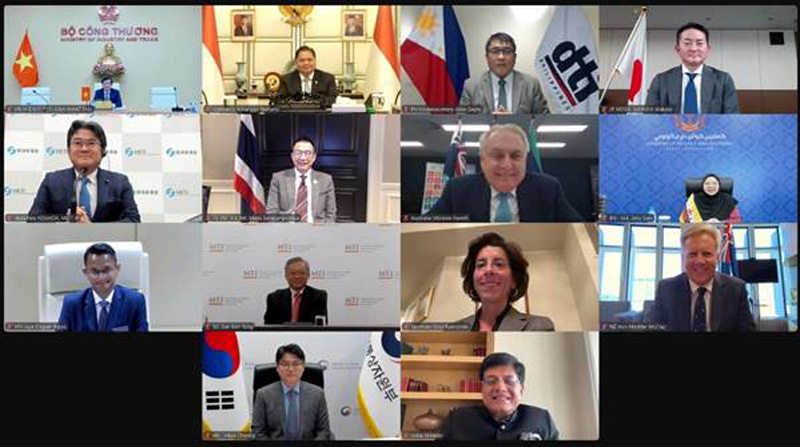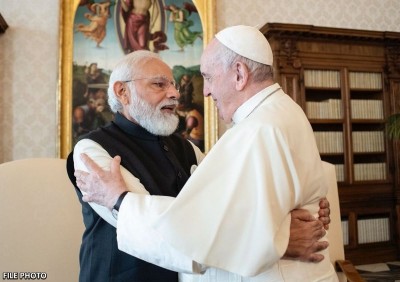 IPEF
IPEF
Piyush Goyal, 13 other IPEF Ministers attend virtual meeting, emphasize further deepening economic cooperation
Union Commerce and Industry Minister Piyush Goyal along with 13 other IPEF Ministers virtually attended the third Ministerial meeting focused on IPEF Pillar II, III, and IV.
In particular, Minister Goyal along with other IPEF Ministers welcomed the upcoming entry into force of the Clean Economy Agreement, Fair Economy Agreement, and the Overarching Agreement on IPEF on October 11, 2024, October 12, 2024, and October 11, 2024, respectively, and emphasized the significant opportunities to further deepen economic cooperation and deliver concrete benefits under the IPEF agreements through ongoing collaboration.
In the virtual meeting, IPEF Ministers reviewed and appreciated the substantive progress made to operationalize the Supply Chain Agreement, deepening cooperation to build more competitive and resilient supply chains, better prepare for, prevent, and respond to supply chain disruptions when they happen, and ensure that regional supply chains raise up workers and respect labour rights.
They outlined concrete next steps for the upcoming months, building on the progress made by the Supply Chain Agreement's three bodies: the Supply Chain Council, Crisis Response Network, and Labor Rights Advisory Board. IPEF partners also highlighted the meaningful collaboration taking place under the Supply Chain Agreement which includes:
The IPEF Ministers noted that the three supply chain bodies – the Supply Chain Council (Council), the Crisis Response Network (Network), and the Labor Rights Advisory Board (LRAB) – met virtually in July to elect leadership in which India was elected as Vice Chair of the Council with US as Chair; Korea as Chair and Japan as Vice Chair of the Network; and the United States as Chair and Fiji as Vice Chair of the LRAB.
Minister Goyal noted that the formation of Action Plan teams in the first in person meeting of supply chain council held in Washington last week, for three critical sectors - semiconductors, critical minerals with a focus on batteries, and chemicals which are highly relevant today given their supply/production concentration and the experience learned from disruptions faced during the COVID-19 pandemic.
The world has witnessed exponential growth in demand for clean energy solutions to meet respective climate goals. The paradigm shift towards a sustainable and low-carbon future has brought to the forefront of the critical importance in securing a reliable supply of minerals which are critical for green transition.
The use of specific minerals is indispensable for the sectors including clean energy, electronics, defence, transportation, telecommunications, fertilisers, and pharmaceuticals. One of the key challenges in supply chains is risk on account of concentration of global capacities or resources, which can add to price volatility and supply uncertainty. The work under the Action Plan team needs to address this global concentration of supply chains in any form.
The growing population puts immense pressure on limited agricultural land for higher yields and in this context, the importance of resilient supply chains for Agro-chemicals has become extremely important. According to an estimate, the Global Agrochemicals Market (fertilizers, pesticides, adjuvants, and plant regulators) is projected to reach USD 282.2 billion by 2028 from USD 235.2 billion by 2023, at a CAGR of 3.7%.
Minister Goyal emphasized that healthcare including pharmaceuticals and medical devices is an extremely relevant area due to over concentration of global production of APIs and Key Starting Materials (KSMs) which can severely impair supply chain resilience and impact our capacity to address the healthcare needs of our economies.
Besides, the multimodal transport systems including multimodal transport corridors, upgrades of logistics infrastructure, enhanced technological interoperability and data flows among freight and logistics enterprises, are some of the key areas which need to be focused upon.
Minister Goyal noted that IPEF’s focus on Logistics and Movement of Good aligns perfectly with Prime Minister Narendra Modi’s vision of Gati Shakti initiative, which aims to improve logistics and transportation infrastructure across India through evidence based integrated planning.
Further, data and analytics on one hand will help identify new opportunities for collaboration for better resilience amongst IPEF supply chains and on other will help identify structural and systemic risks, enhancing the Council’s ability to address current challenges.
He emphasized the workforce development which is a key cross cutting component of building resilient supply chains across the IPEF region should include efforts to identify skill gaps, support reskilling and upskilling, and ensure skill qualification comparability across the region to facilitate workforce mobility.
Support Our Journalism
We cannot do without you.. your contribution supports unbiased journalism
IBNS is not driven by any ism- not wokeism, not racism, not skewed secularism, not hyper right-wing or left liberal ideals, nor by any hardline religious beliefs or hyper nationalism. We want to serve you good old objective news, as they are. We do not judge or preach. We let people decide for themselves. We only try to present factual and well-sourced news.







